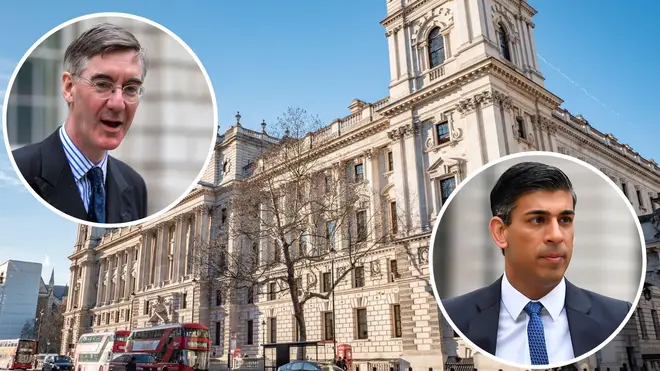
Natasha Devon 6pm - 9pm
9 May 2022, 14:20 | Updated: 9 May 2022, 15:19

Staff at the Treasury will have their security passes monitored for attendance as part of Whitehall's newest attempt to force civil servants to return to the office.
Rishi Sunak's staff have been warned their office security passes will be tracked to ensure staff are regularly coming into the office, but no minimum office attendance requirement has been set.
Whilst the Treasury states there has been a "significant increase" in employees returning to the office, they are currently advertising senior jobs with hybrid work models, requiring staff to be in the office between 40 and 60 per cent of the time.
A government source told The Telegraph: "It has taken far too long for departments to shake off their lockdown mindset, but taxpayers and voters should take heart at reports that Whitehall is taking this seriously."
Read more: Rattled Starmer pulls out of major speech amid Beergate 'hypocrisy' claims

Business Secretary gets grilling on working from home
Relations between the Government and officials have been strained by a drive, led by Jacob Rees-Mogg, to get civil servants staff to return to their desks.
The Government efficiency minister is leading efforts to get staff back in Whitehall offices, challenging Cabinet colleagues to do more to encourage their officials to return to London.
The approach - which has seen him leave notes on vacant desks and threaten to remove the London weighting from salaries of remote workers - was criticised as "Dickensian" by Cabinet colleague Nadine Dorries.
Mr Rees-Mogg presented figures to Cabinet last week showing that some Government departments were using as little as 25% of office capacity in early April.
Unions have objected to Mr Rees-Mogg's approach, with warnings his stance is damaging civil service morale.
Dave Penman, general secretary of the FDA union which represents senior civil servants, warned that "good people will leave and the civil service brand is trashed in a highly competitive employment market".
The Prime Minister said there was a "general issue" in the public sector - and perhaps more widely in the economy - about refusing to give up remote working.
Read more: Inflation could reach 10% and last until 2024, ex-Bank of England chief economist warns

Nick Ferrari clashes with Sajid Javid over working from home
A government spokesman said: "The Prime Minister and Cabinet Secretary have been clear they want to see office attendance across the Civil Service consistently back at pre-pandemic levels and we are seeing significant increases in occupancy which continues to be closely monitored.
"There is total agreement across government on there being clear benefits from face to face, collaborative working and we know that this is particularly important for the learning and development of new and junior members of staff."
It comes after it was revealed the Bank of England only required employees to return to the office one day a week, but they plan to increase the amount of time staff are required to come in to 40 per cent from next month, with plans to eventually increase to 50 per cent.